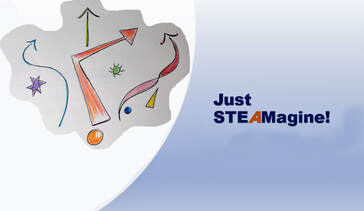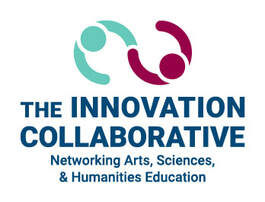 STEAM Imagination By Merrie Koester, PhD, Collaborative Advisory Council Member Pre-pandemic, I received a surprising email from education researcher, philosopher, and editor Dr. David Flinders: Dear Dr. Koester, You have been invited to submit a commentary for Routledge Encyclopedia of Education. I would be grateful if your commentary were entitled "Science Curriculum." To say I was stunned by the invitation would be an understatement. First of all, the challenge to write an encyclopedia entry of any kind implied I had the authority to do so. Does anyone? I also recalled believing as a child that the World Book Encyclopedia was a Great Repository of Truth. And then I reflected on the problem of names and the energy of language. To name something is to stake a claim of knowing its signification. This is a responsibility the Innovation Collaborative has not taken lightly as we’ve labored over what we “mean” when we say STEAM, creativity, innovation, transdisciplinary, etc. Next, I thought about how this this human endeavor we call Science is not about getting things right, but rather about getting them less wrong, using the best evidence available to one at the time. Similarly, the Innovation Collaborative’s work—the research and the practices—don’t just tell what STEAM is, they SHOW how STEAM thinks and performs! Next, I thought about how this this human endeavor we call Science is not about getting things right, but rather about getting them less wrong, using the best evidence available to one at the time. Similarly, the Innovation Collaborative’s work—the research and the practices—don’t just tell what STEAM is, they SHOW how STEAM thinks and performs! As background, I was invited to present a paper at the 2016 American Educational Research Association (AERA) conference for a session called Eisner in Mind: Fresh Perspectives on Inquiry and Education. During my talk, entitled “Imagination and the Arts as Antidotes for STEM Education Malaise and Alienation”, I recalled scientist James Trefil’s writing about “The Great Turn Off” to school science, a disheartening event that occurs sometime around middle school and which Trefil attributed to a near total lack of creativity in traditional science teaching. I didn’t need to convince this room of creatives at AERA that something needed to be done! Like Trefil, I lament the dire consequences of a science illiterate nation. Making science accessible and meaningfully engaging to all students is an ill-structured problem at best, one beset with issues of power, culture, and privilege, and the ever-present requirement that students meet performance benchmarks on content knowledge standards. When a science class is named a STEAM studio, students get to see that the very act of doing science requires a curious, creative mind and heart. Through noticing, listening, attending, and personal story-making – leaning in – science learning begins to matter. And so I accepted the challenge from Routledge, but respectfully asked (and was approved) to change the entry’s title to “Progressive Science Education Curriculum.” I also asked if my colleague, Dr. Meta Van Sickle, might join me as a thought partner. Between us, Meta and I have devoted over sixty years to the research and practice of “Science Curriculum” as a “creative making practice”, decades before anyone named STEAM as educational practice. In 2018, Meta and her colleague, Dr. Judith Batzler, working with IGI, edited Cases on STEAM Education in Practice, to which I also contributed. Gradually, the work for Routledge progressed, in just the same messy, organic way that all creative making requires. During the pandemic, the publishers themselves got creative with the platform, deciding to launch the project under a new name, Routledge Resources Online — Education, in order to better describe the scope of the product and to pivot to an increasingly virtual, post-pandemic world of readers. And now, I’m happy to share that at long last, Progressive Science Education Curriculum has been published! Being part of this incredible collective called the Innovation Collaborative has fueled my hope that we may have finally arrived at a time when we can design and put into practice truly educative and progressive models that provide joyful time and space for creative making and thinking. The Collaborative outreach/research is providing strong evidence to support the claim that STEAM learning experiences, those that are inclusive, empowering, emergent, and creative — not just numbers-based, procedure-driven, and geared toward mastery of knowledge that will be on a test — matter! Just STEAMagine where we’ll go from here! Merrie Koester, Ph.D. Science Literacy, Communication, and STEAM Curriculum Specialist University of SC Center for Science Education Founder, Director, Kids Teaching Flood Resilience
0 Comments
Your comment will be posted after it is approved.
Leave a Reply. |
